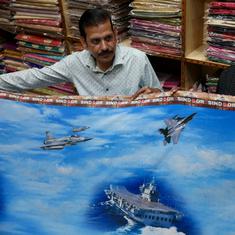I am a modern-day Indian writer. Yes, I write books. But in my meteoric journey through literosphere – from unpublished author living in obscurity in Chennai to semi-comatose writer of three triumphantly unsuccessful books living in obscurity in Chennai – it has come to be that I do many other things with élan.
I have designed my own book jackets. I once did my editor’s daughter’s holiday homework while they vacationed in Burundi. Other than that, I have provided bail money for my literary agent, I have nibbled the feet of litfest organisers as they dangled them in a tank of lukewarm water in a spa in Kerala, pretending to be a small fish, I have gone door to door selling books written by the person in charge of marketing of my books.
Suffice it to say I do what needs to be done.
So I don’t see why I can’t review my own book.
And the conflict-of-interest issue doesn’t arise at all. Because author Krishna Shastri Devulapalli who wrote How to Be a Literary Sensation is a wholly different beast from columnist Krishna Shastri Devulapalli currently reviewing it.
Here’s why.
First, my remuneration of Rs 116.58 (less TDS) for this review is being routed and re-routed via several shell companies into an account that is supported by a completely different PAN from author KSD’s. Secondly, my psychiatrist can vouch for this duality. In fact, his exact words just a couple of days ago were, “You are a different person, Krishna, with the new medication. And, please, put away that nail gun.”
And, finally, a South Indian mega-businessman, cricket enthusiast and family friend who understands this whole conflict of interest thing far better than me has given me the go-ahead and a “All this is jujube. Vandha paathukalaam.”
So here goes.
I can start by saying Devulapalli’s latest book, How to be A Literary Sensation, is a rewarding read. But why would I, when I have adjectives like brilliant, life-affirming and glottogonic at my disposal?
Let’s begin with the premise.
As the subtitle A Quick Guide to Exploiting Friends, Family & Facebook for Financial/Artistic Gain indicates, the book is first and foremost a revenge saga. And a non-fiction one at that. So the blood you see spewed across these pages belongs to real people ranging from old classmates, ex-girlfriends and erstwhile bosses to current editors, bestselling writers and classical musicians. The average reader who satisfies his bloodlust via videos of people being run over by heavy vehicles, maimed by wild animals, or skewered over the flames of Arnab’s burning question can stop scattering himself and get it all efficiently from this one source.
Devulapalli covers all bases. While he starts off by satisfying the standard reader-sadist with this book, it doesn’t mean he ignores the other equally important demographic of his readership: the philistine. C’mon, who among us hasn’t been deeply and psychically damaged by South Indian-Classical music and dance while pretending how great it all is?
For all those who are undergoing therapy today on account of witnessing at a tender age the ataxic convulsions of classical vocalists or the meaningless violence perpetrated on the general public by ageing NRI women under the guise of classical dance, Devulapalli’s book offers hope. It tells you that one can survive, move on and lead a semi-normal life with minimum medication. Except in the month of Marghazhi in Chennai, when it might be wise for survivors to pre-emptively check themselves into an appropriate facility.
Sex. What’s a good non-fiction book without sex, right?
There is oodles of that in HTBALS. (What a sly acronym that is.) In an utterly shameless section dedicated to a couple of ex-girlfriends, Devulapalli lays bare his wild past. Set in exotic locales like Elliots Beach in Besant Nagar and the once undiscovered beaches on ECR, the writer’s romps are described in graphic detail. That none of them is actually consummated owing to untimely interventions by local fisherfolk or the constabulary (and how that has come to be the leitmotif of his connubial life as the book reveals) could be a reason why KSD, at this ripe age, is still rumoured to be “unsullied”.
So far, as reviewer, if I’ve given you the impression that HTBALS is a purely commercial book aimed at out-bankstering the Meluhans, allow me to correct it. Devulapalli is canny and knows what the award committees look for. So there is death. Chennai-style.
In a poignant chapter titled Till Death Do Us Party, the writer takes us across the tragicomic terrain of a local funeral with himself leading the inebriated spontaneous mobile disco of mourners on the roads of Chennai with a defunct Painter Pandi tied up to a chair and smiling through it all. I’ll be deeply surprised if KSD is ignored by the awards panels, if only for this one lyrically moving, profoundly aching, lossfully redemptive chapter alone.
If you think you’ve already got far more from a book costing Rs 299 than you would have got for the same amount from a local massage parlour in the early 1980s, and are rushing to buy it at a bookshop on its last legs in your neighbourhood, hold it. There is more. The meat of the book, in more ways than one, is a solid, no-holds-barred section dedicated to the seamy, spotted, saggy, borborigmous underbelly of the Indian literary scene that no bodyshaper panties can contain. It is the sour-cream icing on this literary dung cake.
Did I hear a cynic say, “Yawn, big deal. What else you got?”
Ha. There is Sunny Leone, too. So take that.
I’m looking forward to more books from this writer. With the right combination of industrial adhesives and experimental veterinary hallucinogens administered judiciously by his doctor, there’s no telling what Devulapalli could come up with next.
Krishna Shastri Devulapalli is a columnist, not to be confused with his namesake, the writer Krishna Shastri Devulapalli whose book How to be a Literary Sensation: A Quick Guide to Exploiting Friends, Family & Facebook for Financial/Artistic Gain this is a review of though they are both equally handsome.










